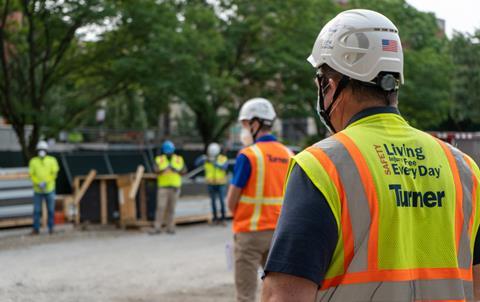Staff being lined up by rivals, worried clients and wider industry jitters make selling business in current climate difficult task, writes Dave Rogers

“I am very worried,” says one consultant, “about who is going to do the work.”
For some, there is a real concern that Lendlease will disappear and the number of major contractors able to take on the really big jobs drops by one. Last weekend marked a month since its Australian owner put the UK construction business up for sale.
Realistically, at the moment, there are only three firms that seem willing to price the mega schemes that spring up in London. Two of them are Mace and Multiplex.
Sir Robert McAlpine does not appear on too many – if any – shortlists, Skanska picks and chooses, Laing O’Rourke – remember them? – seems to only do negotiated work, while the sweet spot for McLaren and Wates is below the £200m mark, the point at which most agree that the really big jobs start.
Balfour Beatty, the country’s biggest contractor by a distance, had a look at London towers a few years ago, lost money and left to go back and concentrate on its bread and butter infrastructure work.
Lendlease, then, is the other firm which is consistently prepared to bid construction jobs over £200m.
Earlier this year, there were three major projects in London all being let at around the same time: 75 London Wall – eventual winner Multiplex; 1 Victoria Street – eventual winner Mace. And 50 Fenchurch Street – eventual winner Multiplex. The other name to bid on two of these three jobs? Lendlease.
Lendlease is on a PCSA at two major schemes in the capital – 120 Fleet Street, where it beat Mace, although that job has ground to a halt because of funding problems – and the ITV Studios redevelopment on the South Bank, which is set for another court hearing this autumn following a well-organised campaign against the plans drawn up by Make. Taken together, those jobs combined are worth around £800m.
So, there are an awful lot of people who are very interested in finding out who, if anyone, will buy Lendlease. Not all of them are rubber-neckers.
Earlier this week, another consultant put it like this: “If you are a client, you have a couple of issues. Confidence in Lendlease’s ability to finish the job, and are staff going to stay? What happens, if they’re not around? Jobs nowadays take years. That’s the issue clients are looking at.”
There are an awful lot of people who are very interested in finding out who, if anyone, will buy Lendlease. Not all of them are rubber-neckers.
Several clients have told Building that they will not give Lendlease new work while the firm is up for sale. “I’d love to, but I can’t,” is one’s assessment.
Lendlease’s UK construction chief executive realises that a quick sale is necessary. “We need to do it at pace,” Simon Gorski told Building this month. “We need to move quickly and diligently. We don’t want an extended period of uncertainty.”

In the meantime, rival contractors have told Building that more and more Lendlease CVs are beginning to land on their desks. “There are always CVs kicking around but there are more than usual [from Lendlease],” one firm said.
Another added that the number he had seen from Lendlease staff had “trebled” in the few weeks following the announcement that it was up for sale. “We’ve drawn up a list of people and we’ve been talking to some of them.”
One senior figure thinks that Lendlease will probably hang on to the majority of staff for the next few months. “There are a lot of people there from the Bovis days, and people are very loyal to each other. I think they will wait and see a bit. But, if it doesn’t get sorted by Christmas, people will get agitated and they will say ‘enough is enough’ and go.”
Another rival contractor adds: “Lendlease need to get the deal sorted. If I was one of their top guys, I would be getting my CV ready. You have to, and you have to start looking. Clients want the best teams and, if Lendlease breaks up, then the number of firms with the ability to do the really big jobs just gets watered down.”
While business is business, there has been sympathy shown by rivals to Lendlease – a sense of shared grief. “We’re all in the same industry and what’s going on there is not nice,” says one boss.
Some have been especially critical of the way the parent company went about making the announcement.
It seems that Gorski was only told about the business being put up for sale a day or two before the announcement, on the final bank holiday in May, which was trailed by a story in an Australian business paper.

“It’s very odd and disrespectful the way they have treated senior staff like Simon,” one rival said. “Surely he isn’t going to fight the Lendlease corner in a sale, particularly if a management buyout is in his mind?”
Group chief executive Tony Lombardo came over for a two-day visit to meet staff and clients, a week or so after the announcement. “Did he bring a minder?” one client wondered.
So, who would buy it then?
There has been speculation that US firm Turner has had a look, while Aecom is another name linked with a bid. Just rumours or more than that? That is the great unknown, but most agree that Lendlease will not get anything like the £285m it paid P&O for what was then Bovis in 1999.
And all agree that there is zero chance of any would-be buyer taking on the firm’s liabilities, the most notable of which are those associated with its purchase of Crosby Homes nearly 20 years ago.
In its last set of results, the firm said that its estimated provision to comply with government requirements on carrying out repairs to buildings 11m and above was AUS$334m (£173m). Lendlease priced the original cost of the remediation at AUS$200m, so a rise of 67%.
One firm put it bluntly when asked if it would consider making a bid: “I would say we would rather let another player go out of the market and naturally increase our market share over time.”
>>See also: Is the City set for a new tower boom?
He added: “[I’m] not sure why a competitor would pay a premium other than commit to TUPE. It’s always so difficult to value a construction company when you have no secured turnover and margins fluctuate so much throughout a project. That’s why frameworks are so valuable when valuing a construction company.
“The other issue will be any building safety and legacy costs. Surely a buyer would leave them with Lendlease?”
Another said he remains convinced that it will go to a buyer from overseas “looking to break into the London market. But you have to be careful. It’s all about relationships and buying them is not a guarantee of success. You need the staff to stay.”
The other factor in all of this to consider is the sort of climate in which Lendlease is trying to sell its UK contracting arm. It’s not great.
“The other issue will be any building safety and legacy costs. Surely a buyer would leave them with Lendlease?”
Just this week, Bam which – thanks to the honesty of its client – everyone now knows has “lost a lot of money” on its scheme to build the Co-op Live arena in Manchester, said it was cutting 40 jobs from its construction business. “Within the construction sector, the market has been particularly challenging over the past couple of years,” it added by way of explanation.
Materials firm SIG issued a profit warning because of subdued demand. And an administrators’ report by FRP Advisory into the collapse of a £100m-plus turnover Hertfordshire contractor called ARJ, which sank two months ago after 33 years in business, concentrated on one reason for its failure: “The company was carrying a number of loss-making projects through this period which have arisen as a result of non-recoverable inflationary increases across materials and labour.”
Non-recoverable seems to be another way of some clients saying: like it or lump it.
One much bigger firm than ARJ says a lot of contractors are carrying jobs which are hitting their bottom lines because they were signed on a fixed price before Russia’s invasion of Ukraine, the huge impact of which has sent materials costs barrelling north.
“Some clients are quite good,” he said. “They say, ‘we can help – not to the extent you want, but we can help’. Fine. Others are really bad: ‘You signed it, get on with it’.”
It is against this backdrop that Lendlease has decided to sell its UK contracting division. And we have not really mentioned margins.
That said, one other bit of news this week might have caught some people’s eyes. Eric Parry Architects recently signed off its annual results: turnover up by half and pre-tax profit well into seven figures from a six-figure return last time. Tickety-boo stuff. It all meant that the practice, which designs many of the big schemes Mace, Multiplex and Lendlease bid, made a pre-tax margin of just under 21%.
Which might be another way of saying that, if Eric Parry Architects was a contractor called Lendlease, owned by an Australian firm of the same name, then it would not be up for sale.

























No comments yet